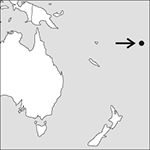
Source: MAPS IN MINUTES™ © RH Publications (1997)
Capital:
Apia
Area:
2831 sq km (1093 sq miles)
Population:
195,476 (2013 est)
Currency:
1 tala = 100 sene
Religions:
Congregational 31.8%; Roman Catholic 19.4%; Mormon 15.2%; Methodist 13.7%; Assembly of God 8.0%
Ethnic Groups:
Samoan 92.6%; Euronesian 7.0%; European 0.4%
Languages:
Samoan (official); English
International Organizations:
UN; Commonwealth; Pacific Islands Forum; Secretariat of the Pacific Community; WTO
A country consisting of a group of nine islands in the south-west Pacific and forming part of the Samoan Archipelago.
Physical
The country’s two major islands, Upolu and Savai’i, are both volcanic and are fringed by coral reefs. The islands have evergreen rainforests and swamps.
Economy
The economy of Samoa is based on agriculture and fishing, which employ two-thirds of the workforce. The main industry is food processing, and fish, coconut cream, coconut oil, beer, and copra are the principal exports. Until recently the largest private employer was a Japanese car component factory, which at its peak accounted for a third of Samoa’s exports. However, its closure was announced in 2016. Tourism is expanding and contributes a quarter of GDP.
History
The Samoan archipelago was first settled in about 1000 bc and was the centre of Polynesian migrations eastwards. Although sighted by the Dutch in 1722, the first European to set foot on the islands was Louis-Antoine de Bougainville in 1768. Germany, Britain, and the USA competed for control of the archipelago until 1899 when the western part of Samoa passed to Germany and the eastern islands became American Samoa. Western Samoa remained a German protectorate until 1914; thereafter it was administered by New Zealand, initially (1920–46) under a League of Nations Mandate and then as a UN Trust Territory. It gained full independence in 1962 as Western Samoa and joined the Commonwealth of Nations in 1970. Susuga Malietoa Tanumafili II became head of state in 1963. He is a constitutional monarch with the power to dissolve the legislative assembly, which is known as the Fono. In 1990 universal adult suffrage was introduced. In 1997 the country’s official name was changed to Samoa. When Tanumafili died in 2007, Samoa became a republic with the new head of state, Tuiatua Tupua Tamasese Efi, being elected by the legislative assembly; he was re-elected in 2012. Tuila'epa Sailele Malielegoai has been Prime Minister since 1998 and has been widely accused of concentrating more power in his own hands. His party, the Human Rights Protection Party, won a landslide victory in 2016.
- cut free
- cuticle
- cuticularization
- cutin
- cut(in a network)
- cutinite
- cutinization
- cutis
- cut-off
- cut-off frequency
- cut-off grade
- cut-off high
- cut-off low
- cut-off trench
- cut-off voltage((of a television camera tube))
- cut-out
- cutout
- cut plane
- cut point
- cut-point
- cut set
- cut-sheet feed
- cuts in expenditure
- cut-throat competition
- cutting